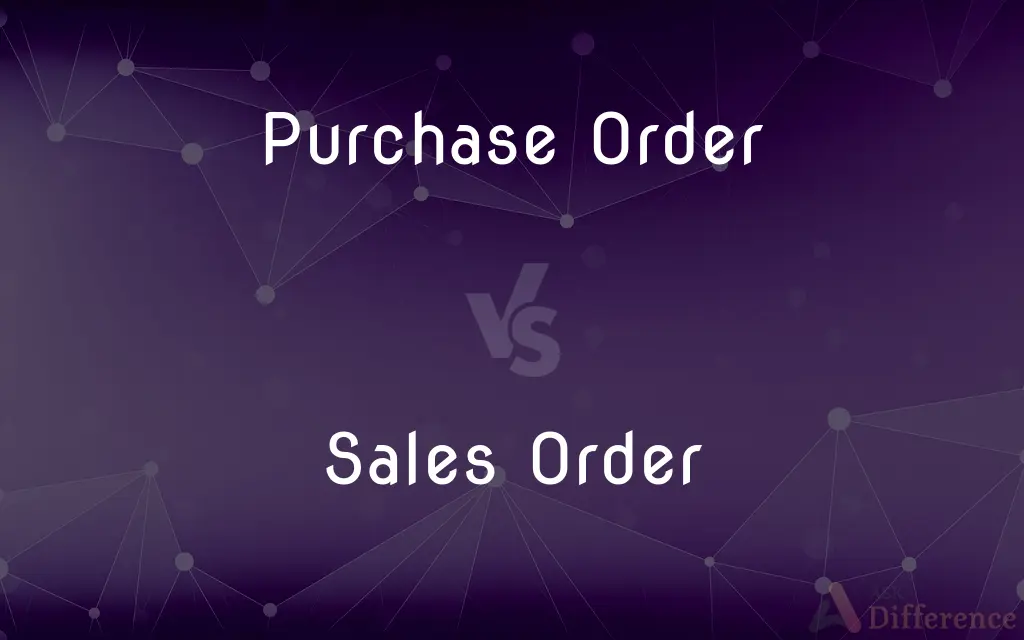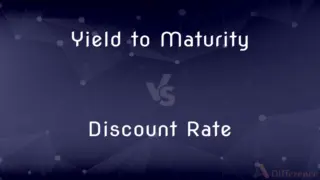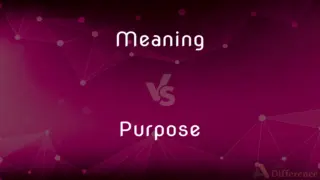Purchase Order vs. Sales Order — What's the Difference?
By Tayyaba Rehman — Published on October 26, 2023
A Purchase Order (PO) is a document from a buyer to a seller indicating types, quantities, and agreed prices for products or services. A Sales Order (SO) is a confirmation document sent by the seller to the buyer after a purchase order is received.

Difference Between Purchase Order and Sales Order
Table of Contents
ADVERTISEMENT
Key Differences
A Purchase Order, commonly referred to as a PO, is an official document initiated by the buyer to request products or services from a seller. On the other hand, a Sales Order, often abbreviated as SO, is generated by the seller to confirm the sale of products or services and details the specifics of the sale.
The Purchase Order serves as an authorization for the seller to provide the specified products or services at the agreed-upon price. Conversely, the Sales Order represents the seller's acceptance of the buyer's request and solidifies the terms of the transaction.
In the context of business operations, the Purchase Order is often the first step in the procurement process, signaling the intent to buy. The Sales Order, meanwhile, is the affirmation from the seller's side, ensuring the buyer that their request is in the process of being fulfilled.
While both Purchase Order and Sales Order might seem similar, their roles are distinct. A Purchase Order is essentially a contract from the buyer to the seller, while a Sales Order is a commitment from the seller to the buyer.
Documentation is crucial in business, and both the Purchase Order and Sales Order play pivotal roles. The Purchase Order protects the buyer, ensuring they get what they've requested. The Sales Order, in turn, protects the seller by confirming what has been agreed upon.
ADVERTISEMENT
Comparison Chart
Originator
Buyer
Seller
Purpose
Request for goods/services
Confirmation of sale
Role in Transaction
Indicates intent to buy
Affirms intent to sell
Binding on
Seller
Buyer
Protects
Buyer by specifying terms
Seller by confirming terms
Compare with Definitions
Purchase Order
A Purchase Order serves as a formal request to purchase specific products or services.
Based on the team's requirement, a Purchase Order was generated.
Sales Order
A Sales Order is a confirmation of the acceptance of a buyer's purchase request.
The company felt reassured upon receiving the Sales Order.
Purchase Order
A Purchase Order outlines the terms, quantities, and agreed prices between buyer and seller.
The vendor received a detailed Purchase Order with itemized costs.
Sales Order
A Sales Order serves as a record of a sales transaction between buyer and seller.
For accounting purposes, every Sales Order is carefully archived.
Purchase Order
A Purchase Order acts as a legally binding document between a purchaser and a supplier.
Without a valid Purchase Order, the supplier refused to dispatch the goods.
Sales Order
A Sales Order details the terms of sale, including product, price, and delivery information.
The Sales Order listed all items with their respective prices.
Purchase Order
A Purchase Order is a tool used to authorize a purchase transaction.
The finance department approves the Purchase Order before any funds are released.
Sales Order
A Sales Order is a document generated by a seller confirming the sale of items to a buyer.
Once the Purchase Order was received, they processed a Sales Order.
Purchase Order
A Purchase Order is an official document issued by a buyer to a seller, detailing the items to be bought.
The company sent a Purchase Order for 100 computers.
Sales Order
A Sales Order indicates the seller's intent to supply specific products or services.
The Sales Order confirmed the delivery date and quantity.
Common Curiosities
What is a Purchase Order?
A Purchase Order is a formal document issued by a buyer to a seller detailing the items or services they wish to buy.
What is a Sales Order?
A Sales Order is a document generated by the seller confirming the sale of items or services to a buyer.
Who creates a Sales Order?
The seller creates a Sales Order.
Is a Purchase Order legally binding?
Yes, a Purchase Order acts as a legally binding contract between the buyer and the seller.
Can a Sales Order exist without a Purchase Order?
While a Sales Order typically follows a Purchase Order, there can be instances where a Sales Order is created without a preceding Purchase Order.
Who initiates a Purchase Order?
The buyer initiates a Purchase Order.
What does a Sales Order confirm?
A Sales Order confirms the seller's commitment to provide the specified goods or services to the buyer.
What information is included in a Purchase Order?
A Purchase Order typically includes details like product specifications, quantities, prices, and delivery information.
Are both Purchase Order and Sales Order necessary for a transaction?
While not always necessary, both documents add clarity and protection for both parties involved in a transaction.
How does a Purchase Order differ from an invoice?
A Purchase Order indicates intent to purchase, while an invoice is a request for payment for goods or services already delivered or provided.
Can a Purchase Order be canceled after issuing a Sales Order?
Canceling a Purchase Order after a Sales Order is issued usually requires mutual agreement and may result in penalties or fees.
What follows after a Purchase Order is issued?
After a Purchase Order is issued, the seller typically responds with a Sales Order.
Is the Sales Order the final document in a sales process?
No, after the Sales Order, other documents like shipment notices, delivery confirmations, and invoices might follow.
Can a Sales Order be edited after it's issued?
Typically, once a Sales Order is issued, any changes require mutual agreement or a new order.
Why is a Purchase Order important for businesses?
A Purchase Order helps businesses maintain accurate records, manage budgets, and avoid disputes.
Share Your Discovery

Previous Comparison
Yield to Maturity vs. Discount Rate
Next Comparison
Meaning vs. PurposeAuthor Spotlight
Written by
Tayyaba RehmanTayyaba Rehman is a distinguished writer, currently serving as a primary contributor to askdifference.com. As a researcher in semantics and etymology, Tayyaba's passion for the complexity of languages and their distinctions has found a perfect home on the platform. Tayyaba delves into the intricacies of language, distinguishing between commonly confused words and phrases, thereby providing clarity for readers worldwide.
















































